Introducing our eCommerce SEO (UK) Report 2020
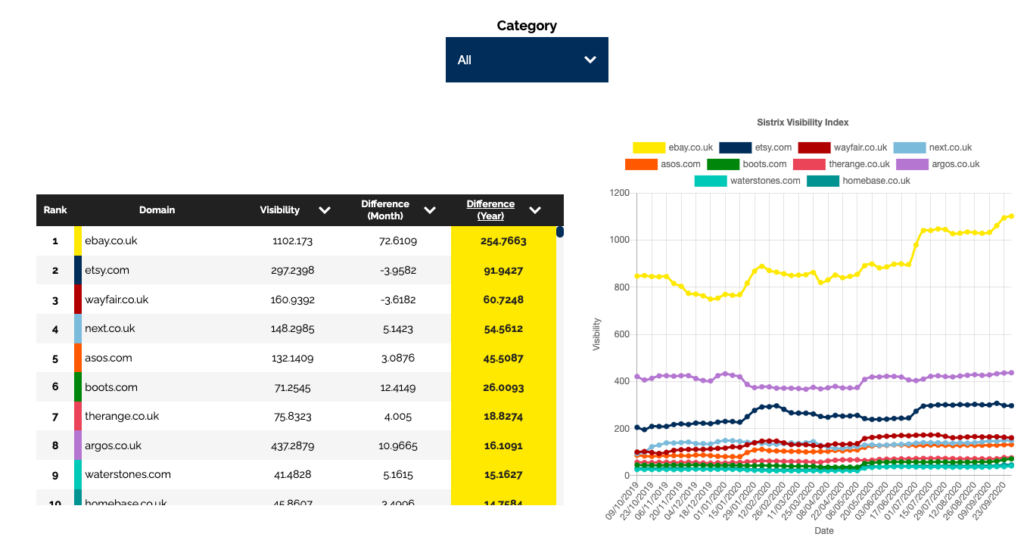
We’re very excited to launch our eCommerce SEO (UK) 2020 report today. This has been a big project for us over the summer, where we’ve put together:
- Trends of the retail sector in 2020 and outlook for 2021 and beyond, with insights from KPMG’s Head of UK Retail, Paul Martin on the.
- Expert SEO views on the impact of Covid 19, plus how you should be adapting your strategies – with a big thank you to Dewi Nawasari, Luis Navarrete Gomez, Julian Pettit, David Williams, Alina Ghost, Omi Sido, Orit Mutznik, Samantha Chilcott, Federico Rebeschini and Juan Daniel Mínguez for their contributions.
- Organic visibility winners/losers –
» Read more about: Introducing our eCommerce SEO (UK) Report 2020 »
KPMG: UK retail sector trends 2020 & forecast 2021

Last week, Paul Martin, Head of UK Retail at KPMG kindly joined myself for a video interview to talk about the trends of the retail sector in 2020, what’s to come in 2021 and where we should be focusing our attention/efforts in order to be successful.
Trends of 2020:
It’s a fluid situation. We experienced the first instances from a health perspective from January, and of course, from a global perspective, things are changing country by country since.
- Retail in the UK is a £395bn industry. The store shutdown during March and April had a large negative impact on retailers.
- In April/May, we expected a 5-6% overall annual decline in annual sales.
- After a more buoyant Summer (June, July, and August) even though we still expect a decline, the performance was much better than expected, and we now believe the annual outlook is more likely to be 1% drop.
- Heading into the final golden quarter, this is so important for performance. Especially with furlough unwinding, we have lived in a protected bubble for a certain amount of time, and we’ll expect to see a negative financial impact from the end of October.
- Retail can’t just be looked at in its entirety.
- If you look at the food category or home, they have faired very well. 42% of all food pre-covid was consumed out of home, large parts of that economy have come to a significant standstill. More consumers are now eating at home, so the grocery sector in some cases have seen double-digit increases.
- Furniture, Home-wear, DIY (specifically over the summer) have also seen positive uplift.
- On the flip side, some categories have experienced a more challenging environment –
» Read more about: KPMG: UK retail sector trends 2020 & forecast 2021 »
Rand Fishkin: Where you spend your money matters
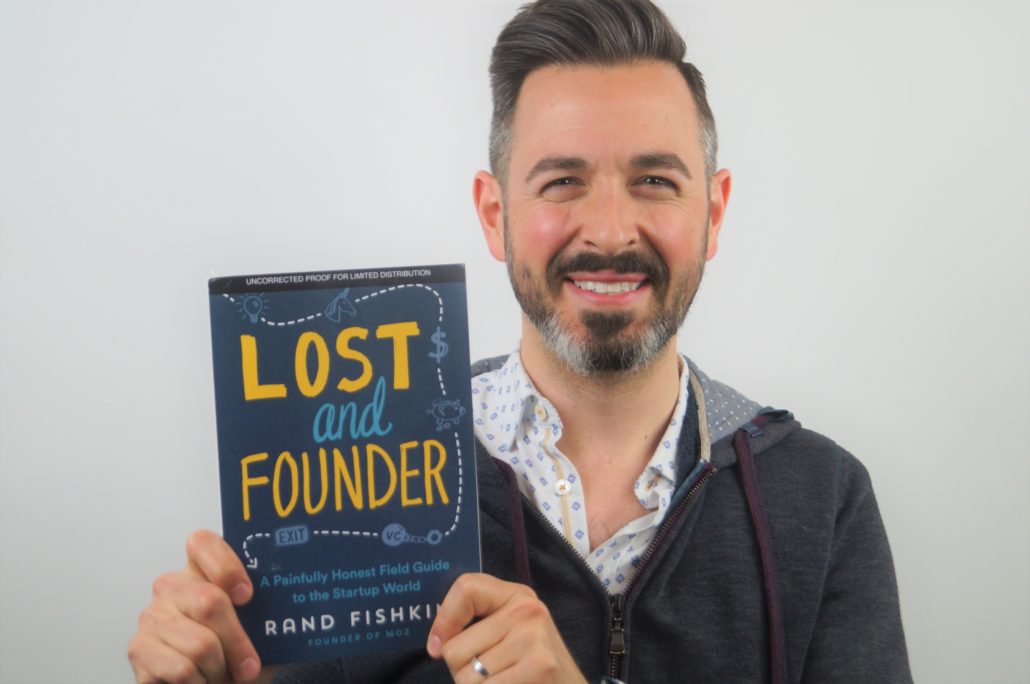
This morning I had a video discussion with Rand Fishkin, who was keen to show what he’s been up to with Sparktoro and how this can be useful for marketers to be smarter with their targeting.
We discussed a number of topics, all of which are available to watch in the video recording below. However, the thing that struck me most from this conversation was Rand’s clear purpose on doing the right thing – with a clear social conscience on where the profits from the corporations are re-distributed to.
There’s a disillusionment with Google and Facebook, who have become too powerful. They hold too much control in terms of where ad dollars are spent, how much traffic/revenue they provide, and the reliance on this for brands means that they have a huge amount of control, that if they turn it all off businesses could hugely suffer, if not disappear, overnight.
If you’re a market leader, brute force media buying wins. If you’re the plucky underdog, you simply have to be smarter with your approach, otherwise the biggest budgets win.
There are many ways you can do that, which Rand shows:
- Find the publishers who have the most influence within your target audience –
» Read more about: Rand Fishkin: Where you spend your money matters »
What is the brand impact on SEO performance?
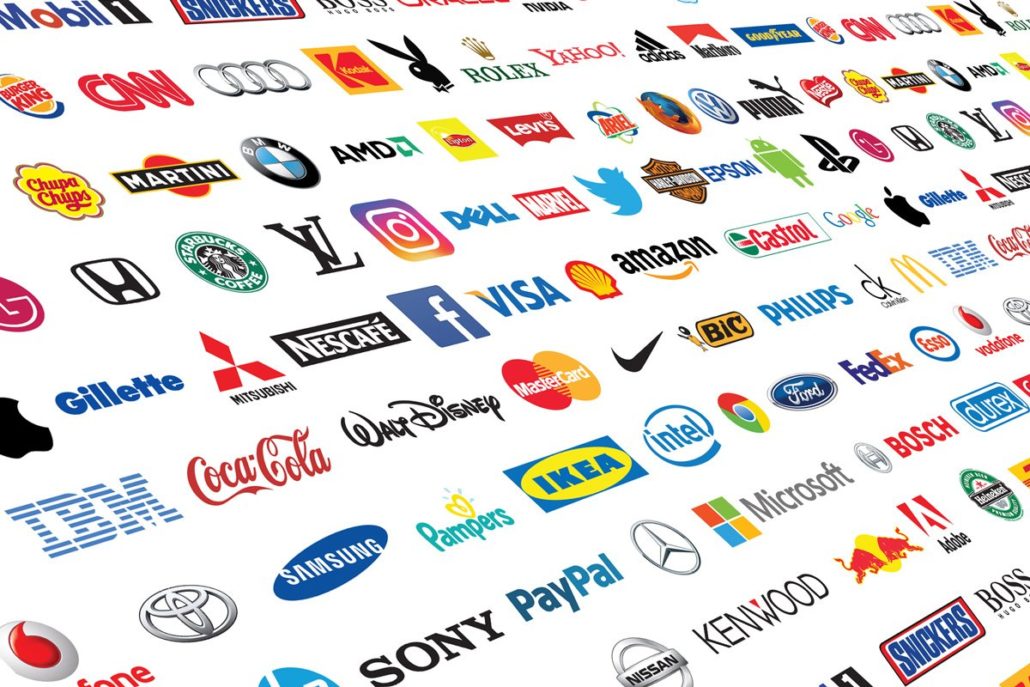
For a long time, I think it’s been clear that brand is an important signal in what Google values for ranking websites.
But what does ‘brand’ mean in an SEO context?
In the early days of Google, PageRank (named after Larry Page – also sounds much better than BrinRank) was introduced to rank sites based upon the quality and quantity of inbound links to a specific page and domain. Of course, it’s become much more sophisticated since, and there are now other factors that are thrown into the mix.
Let’s forget about Google for a minute, though. What would you consider to be the factor of a strong online brand?
» Read more about: What is the brand impact on SEO performance? »
Why you need a strategy-first approach to SEO

If you don’t know where you’re going, don’t complain about where you end up.
This is something a mentor of mine has told me a few times. It’s a lesson that applies equally to business, life and SEO.
Let’s set the scene. We’ve all been there. That client meeting where you’ve done a great job; showed them you’ve fixed 983 issues, gained rankings for 102 keywords, secured 52 links etc. All to get asked “so what”?
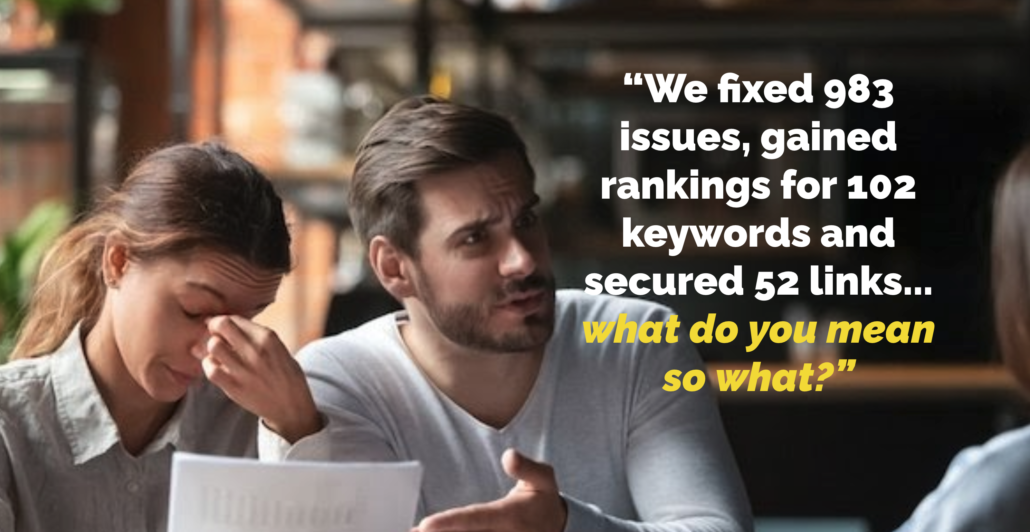
It’s disheartening. What went wrong? Why didn’t they get it?
It’s not you, it’s me…
» Read more about: Why you need a strategy-first approach to SEO »
5 Steps to help you identify the cause of visibility loss
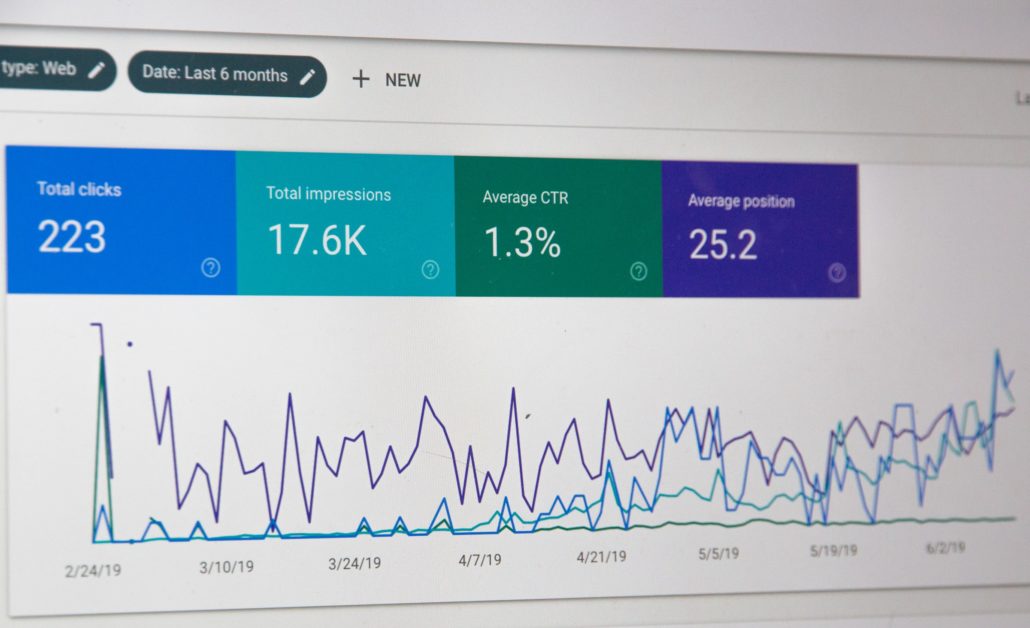
I was recently asked to speak at the SMX London conference on ‘Identifying Core Algorithm Impact and Key Actions to Recover From Its Search Visibility Loss’. My presentation got me thinking about the myriad potential causes for a drop in organic visibility and the juxtaposition between two constants; the ever-changing landscape of SEO and the basic principles behind how we identify and address the reasons for poor SEO performance.
At Re:signal, whenever we’re approached by clients with an organic visibility drop, we follow the same process, irrespective of the industry the client works in or the product/service they offer. Even if we have a strong suspicion about what the issue may be (core algorithm update, lost links, technical SEO issues, etc.), we go through this process to ensure that our efforts are addressing the issue at its root cause. In essence, it’s a process of elimination, analysing the available data to confirm what’s not an issue, before we embark on a strategy to address the real problem.
How do you identify the cause behind an SEO visibility drop? » Read more about: 5 Steps to help you identify the cause of visibility loss »
How to enhance your Digital PR outreach with expert quotes

My colleagues will tell you that I’m often bleating on about the importance of supplying expert comment and quotes, it’s something I’ve become increasingly passionate about during my time as a Digital PR, mainly because I think it works! With that in mind, I thought it would be helpful to share all of my thoughts and tips in one place.
Adding an expert comment is important for the majority of Digital PR campaigns, they increase your chances of success from the start or they can really help save a flagging campaign; adding them into pitches that have been struggling has helped colleagues and myself land links on top-tier publications such as Stylist, Express.co.uk and even the New York Post.
So, in this article, I’ll be sharing insights into why quotes matter, who to approach for the best-possible quotes/expert comment and the best way to reach out to them.
Why do quotes matter?
» Read more about: How to enhance your Digital PR outreach with expert quotes »
41 SEO quick wins you can do within an hour

You’ll struggle to find someone who believes more in the importance of a long-term SEO strategy than myself. Short-term spikes are great in the moment, but any of the results I’m most proud of working on are those which show steady growth against key business goals over a sustained period of time.
I’d always advocate a strategy-first approach and I’ve written before about how short-termism is killing marketing, however that doesn’t mean there’s no quick wins.
SEO is a long-term investment, and often a leap of faith in what you’re doing now will pay-off further down the line. The key to success is alignment with your business objectives and the prioritisation of actions that are going to take you closer to achieving those goals.
For that reason, it makes sense that you pick off the low hanging fruit early and it’s important to build trust and show meaningful progress that you’re climbing the mountain on the way to more ambitious goals.
The aim should be for short term impact which builds into long term success.
Given the impact of coronavirus, it’s more important than ever to ensure your SEO activity is working for you. I’ve spoken with a number of marketers recently, who share the view that now is a good time to either apply changes they wanted to for a while, or learn/apply new skills outside of their specialist skillset.
I’ve collated 96 of my own SEO quick wins in the past, but that was 7 years ago and well overdue an update. To lend a helping hand, I leveraged the power of social media crowdsourcing to ask for peoples favourite SEO tips, so that we could share the best ones with you.
Without further ado, here they are:
- Quick wins in SEO in tough times definitely means increasing sales not necessarily traffic. SEO for UX can help to increase conversion rates. For example, adding a sort by price to ecomm navigation and filters can help users sort the price they can currently afford. Halide Ebcinoglu
- Page 2 poaching –
» Read more about: 41 SEO quick wins you can do within an hour »
COVID-19 comms: how to navigate Digital PR during a pandemic

Digital PR methods have changed drastically over the last few years. ‘Failsafe’ campaign concepts that were once guaranteed to land links on an array of top-tier publications began falling flat last year. Publications increasingly began changing their links to no-follow. And, of course, we’re attempting to navigate tougher times than ever with COVID-19.
However, it’s not all doom and gloom. It’s been incredible to see journalists, digital marketers and Digital PRs come together in these uncertain times to help one another. It’s also been great to see the industry evolving and adapting to the changing landscape.
I’ll be sharing some of my key insights, as a Digital PR and a former journalist, and observations from the webinars I’ve watched so far.
It’s more important than ever for us to be following best practices, so I’ve listed some of the most important ones below, along with additional things to keep in mind.
How to land coverage amid COVID-19: 8 tips
I have already noticed that many Digital PRs have been incredible at employing the following techniques and landing coverage for their clients in a relevant manner, rather than finding a way to shoehorn them into the current agenda.
1. Read the news daily
The news cycle is changing at a rapid pace, so reading through a range of publications (both ones that you are and aren’t planning to target) is very important. Not only for keeping up with current affairs, but a quick browse through a variety of news sites can also inspire ideas, give you angles to work with and provide a clearer understanding of how the agenda is developing.
2. Embrace Twitter
I cannot stress the importance of this enough. While I’m active on Twitter most of the time, I’ve recently spotted opportunities that I never would have seen without the help of Twitter. As always, use the #journorequest hashtag to help you find journalists who could be the perfect fit for a pitch, maintain relationships with journalists (in a non-contrived way) for use in the future, or see if your client can offer reactive comments for a piece.
3. Make your subject lines stand out
I’ve said this before in my talk at Cardiff SEO and it’s essential right now. You could have the best pitch for your campaign, but if your subject line is too wordy and flat, your email will go straight into the bin. Make sure you could see your subject line as a headline. By this I mean, if you read your subject line tweeted out as a story headline, would you click on it?
» Read more about: COVID-19 comms: how to navigate Digital PR during a pandemic »
Covid-19: What is the impact of coronavirus to SEO?

We ran a Zoom call this morning with 18x senior in-house SEOs, to discuss the impact of coronavirus to digital marketing. I wanted to share the common themes / insights to help everyone.
How does the Covid 19 pandemic impact business and what is the knock-on effect?
- A lot is changing day by day as new information arises, and decisions are being made quickly based on the insights we have. For now the focus for everyone has to be short-term on how to come out as strongly as possible.
- Hopefully Government grants/loans will help, but companies are needing to make cutbacks –
» Read more about: Covid-19: What is the impact of coronavirus to SEO? »


